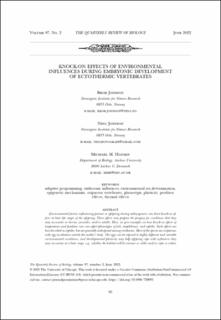| dc.description.abstract | Environmental factors influencing parents or offspring during embryogenesis can have knock-on effects at later life stages of the offspring. These effects may prepare the progeny for conditions that they may encounter as larvae, juveniles, and/or adults. Here, we give examples on how knock-on effects of temperature and predator cues can affect phenotypes of fish, amphibians, and reptiles. Such effects are best described in reptiles, but are generally widespread among ectotherms. Most of the species are oviparous with egg incubation outside the mother’s body. The eggs can be exposed to highly different and variable environmental conditions, and developmental plasticity may help offspring cope with influences they may encounter at a later stage, e.g., whether the habitat will be warmer or colder and/or safer or riskier than what they a priori are adapted for. Knock-on effects can be considered a subset of phenotypically plastic responses. They can be instantaneous or delayed, have a physiological foundation, and can be manifested as temperature-dependent sex determination and changes in morphological, physiological, lifehistory, and behavioral characters. They are often, but not exclusively, assumed evolutionarily favorable, particularly beneficial for invasive species and during periods of rapidly changing environments. However, although several studies suggest that plasticity in some cases increases survival and reproductive success, the fitness gain is still virtually untested. It is assumed that epigenetic mechanisms, such as DNA methylation and histone modifications, could ultimately be important components of molecular mechanisms that allow early perceived cues to be expressed at a later stage in life. Although some empirical cases support this, evidence is still mostly circumstantial. Future research should investigate mechanisms and fitness effects of early environmental stimuli. These effects are important for the ecology of species and should be taken into account in experiments on ecological effects of environmental variables. This is of particular interest today because of climate change and increasing anthropogenic habitat alterations. adaptive programming, embryonic influences, environmental sex determination, epigenetic mechanisms, oviparous vertebrates, phenotypic plasticity, predator effects, thermal effects | en_US |

